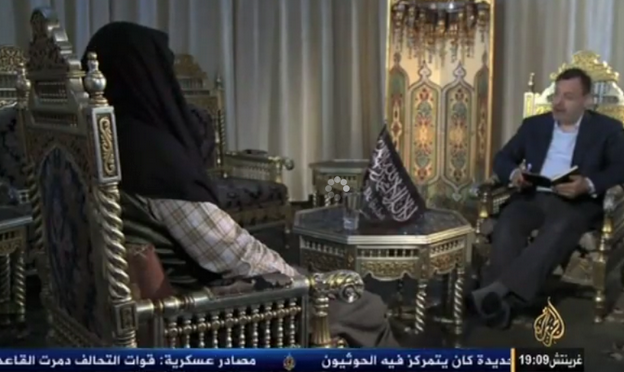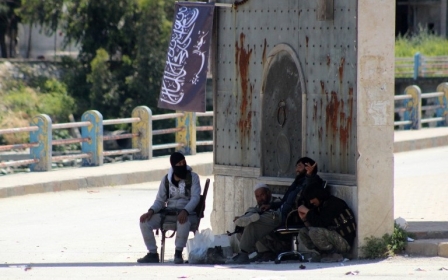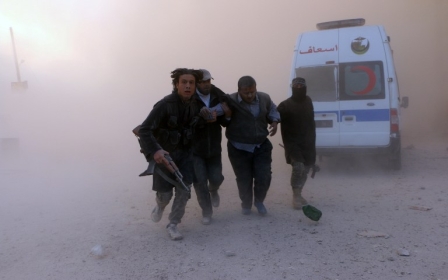Chief of al-Qaeda's Syria affiliate pledges no attacks on the West

BEIRUT - Al-Qaeda's Syria affiliate will not use Syria as a launching pad for attacks on the West, its chief said in a wide-ranging televised interview late Wednesday.
Without showing his face, Abu Mohamed al-Jolani said his group, the al-Nusra Front, would protect Syrian minorities that renounced the regime.
The interview was Jolani's second with Qatari-owned Al Jazeera TV since a similar appearance in 2013. The interviewer, Ahmad Mansur, said it was broadcast "from liberated lands in Syria".
All that could be seen of Jolani was a black shawl, a plaid shirt, and gesturing hands.
"The instructions that we have are not to use al-Sham [the Levant region] as a base to launch attacks on the West or Europe, so as not to muddy the current war," Jolani said.
"Our mission in Syria is the downfall of the regime, its symbols, and its allies, like Hezbollah," Jolani said, referring to the powerful Shiite movement fighting alongside the Bashar al-Assad regime.
But if the United States kept attacking them, he said, "all options are open. Anyone has the right to self-defence."
Jolani also denied the existence of the "Khorasan group", which the US had said was an offshoot of al-Qaeda that was plotting attacks against the US.
Nevertheless, he lambasted the US for its air raids against al-Nusra in Syria and accused it of coordinating with the Assad regime on the use of air space.
"America is propping up the regime," Jolani charged, leaning forward in an ornate golden-crusted chair.
'We will protect them'
Al-Nusra and its rival, the Islamic State (IS) group, have been designated as “terrorist organisations” by the US since the end of 2012.
Since September, a US-led international coalition has been bombing militant positions in Syria, although most strikes have targeted IS.
In recent months, al-Nusra has led a rebel coalition in a series of key victories in Syria's northwest Idlib, including the provincial capital and a large military base.
The gains have opened the road for a potential advance on Latakia and Tartus, coastal provinces that are home to Syrian minorities including Christians and Alawites, the offshoot of Shiite Islam to which the Assad clan belongs.
Extremist groups in Syria, including al-Nusra and IS, have been accused of targeting these minority communities.
But al-Nusra's chief seemed to try to play down those fears, saying his group "only fights those who fight us".
"If the Alawites leave their religion and leave Bashar al-Assad, we will protect them," Jolani said.
He said Christians living under the rule of al-Nusra were living in peace, and that in a future state ruled by Islamic law, the financially capable would pay "jizya", or tax reserved for non-Muslims.
'Gateway to Damascus'
Jolani promised defeat for Lebanese movement Hezbollah, which has significantly bolstered the Assad regime, in the mountainous border region between Syria and Lebanon.
"Hezbollah knew the ugliness of the Syrian regime. It knew its fate was directly linked to Bashar's fate," Jolani warned.
"Qalamoun will be an important gateway for Damascus when the battle for the capital begins," he added.
"As soon as Bashar is defeated, it will be the end for Hezbollah."
Much like his interview in 2013, the al-Nusra chief said the end of the Assad regime was near.
"I assure you, the fall of Bashar is not far away," he said. "I do not want to project much optimism, but there are very positive signs."
He rejected a political end to the conflict, saying that any political agreement "reached in the halls of Washington ... would cost the blood of the Syrian people".
Jolani also firmly denied receiving any state funding, saying that al-Nusra was financed by its own "businesses activities" and contributions from individual donors.
Wednesday's interview was the first in a two-part series, to be continued next week.
New MEE newsletter: Jerusalem Dispatch
Sign up to get the latest insights and analysis on Israel-Palestine, alongside Turkey Unpacked and other MEE newsletters
Middle East Eye delivers independent and unrivalled coverage and analysis of the Middle East, North Africa and beyond. To learn more about republishing this content and the associated fees, please fill out this form. More about MEE can be found here.




